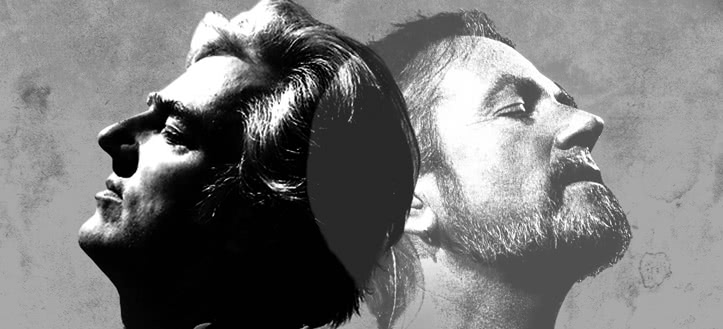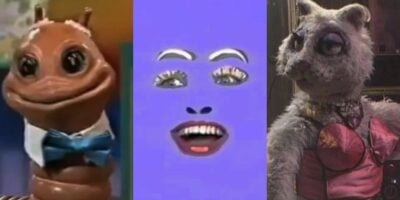Inthe last three-and-a-half decades, Steve Kilbey and Robyn Hitchcock have churned out more than 1,000 songs between them. Kilbey is perhaps best known as the bass-playing frontman for Sydney’s psychedelic pop masters The Church, but his solo and collaborative records are just as constant as the band’s. Hitchcock first made an imprint fronting London’s ironic post-punk group The Soft Boys, but since the early ’80s he’s been leading his own enterprise. Right now the poetically inclined pair are taking the Insects And Stars tour around the country, but prior to this they hadn’t actually met. In a special BRAG feature, we got Kilbey and Hitchcock together and let them do the talking about each other’s art and career choices.
Steve Kilbey: When you write a song do you write it by grabbing a guitar, strumming some chords and going [sings], “I feel pretty good today…”? Or do you work with a tape recorder or a computer, slowly building up little pointillistic things?
Robyn Hitchcock: Either there’s something about the way I play a couple of chords that suggests there’s going to be a song, or I flick through my notebooks, because I write a lot of stuff when I’m moving around. If you’re on a train or a plane or somewhere you can’t play the guitar, all you can do is write.
SK: You could get on GarageBand and write a song.
RH: I could, but I’d have to have a laptop working. I’m a bit of a luddite. I’m not really very machine-friendly. About 2000AD I bought a dictaphone to write songs into. That was alright, but it was very hissy. Now, either I remember a song or I don’t, so the strong ones survive.
Songs are like cats, they turn up when they want to. You can’t open for business at 9:30 on Monday morning and say, ‘OK song, step this way.’
SK: So far you’re reminding me of Grant McLennan. This is how he was with songs, suddenly it was just happening out of the blue. Whereas, if someone wants me to write a song at 9:30 on Monday morning, I will fucking write a song. There’s other people who have a more mysterious relationship with it.
RH: I think that’s probably me. Although I’ve written a lot I can’t take them for granted. They just appear when they will. Like bats or fireflies, they really are elusive. How do you feel about colour and sound? Are you very synaesthetic?
SK: I don’t have that unless I’m on some psychedelic drug. I have another thing with words, [which is] also regarded as a problem if you’re mentally ill. It’s semantic hyper-priming, like a constant bombardment of words. This is the way they judge a lunatic: if the guy doing the test says, “Dog,” most people say, “Walk, collar, bark,” but if you ask a lunatic or an eccentric old rocker with semantic hyper-priming, he’s going to say, “Galaxy, miserable” – anything at all, because his mind hasn’t been wired up that way.
RH: Well, you know, no mental illness, no talent, basically. That’s the trade-off. Don’t you think creativity’s there as a way of processing the difficulty we have with existence? It seems like we’re doing this to process the fact that life is not working for us the way we expected.
SK: [Laughs] I agree with that. Guys like you and me who have been doing it a long time and written lots of songs, and yet we’re not going around on the circuit doing some old thing we did – we’re writing lots of new songs and people like our new songs pretty much as much as our old songs – we’re chronic songwriters.
RH: It’s a habit that one acquires that one can’t really shake. What did you listen to when you were growing up, when you were ten or 11?
SK: I listened to The Beatles and I had Beatles magazines and I was sort of an aficionado of Dylan and the Stones. I was the kid down the back of the class drawing pictures of guys playing guitar. I was obsessed with rock’n’roll. Eventually, at 16, I nagged my father to get me a bass guitar.
RH: Why did you go for the bass? You sensed that’s where the power lay?
SK: I went to a school social and saw a band and the guitars and the drums were exciting, but then there was this other sound. It wasn’t even like a sound. It was sort of hitting you in the guts and I just thought, “Fuck, I have to do that. That’s my vocation – to make that sound.”
RH: In that case you’re on a mission for your 16-year-old self, which we all are, certainly in this business. I recently made a record produced by Joe Boyd [Pink Floyd, Nick Drake], so I’ve impressed my 16-year-old self. But I don’t know whether he’d like it. He might find it a bit too mellow.
SK: Robyn, if our 16-year-old selves confronted us what would they fucking expect? We’ve stayed true to it. We’re not on the cabaret circuit, we still love what we’re doing and we’re minstrels. We haven’t made millions of dollars. We’re still going around doing it half for love, half for money and half because we’re fucking mad!
Catch Steve Kilby and Robyn Hitchcock at the Metro Theatreon Saturday May 10, tickets available through Ticketek.


































